RAISINS
Iran is the third largest exporter of raisin in the world by exporting more than 150,000 MT (27% global Consumption) of raisins worth around 250 million dollars annually. There are different varieties of Iranian Raisins; Sultana Raisins (Superior Qualily-Dark color),sultana raising (Light color - Malayer) Golden Raisins, Black Raisins and Green Raisins. The advantage of Iranian Raisins is principally its price, minerads and different methods of price, mine rals and processing, and that's the reason why Iranian Raisins minerals are amongst the finest raisins in the world.
In Iran we can divide the variety of raisins into Seeded Raisins Unseeded Raisins, Green raisins, rice raisins and currants. Green raisins and rice raisins are obtained from seedless grapes and Currant is provided from variety of seeded grapes. We explain raisins preparation method, because these names are related to raisins preparation method as well as the kind of grapes, which is used in raisins production. In Iran over 200 varieties of grapes have been named in different languages, but it is obvious that most of these names are related to one item that has found different names in different locations.
Arami Group supplying and exporting 5 kind of Raisins:
• Golden Angori Raisins
• Golden Kashmary Raisins
• Sultana Raisins
• Malayer Raisins
• Sun-Dried Raisins
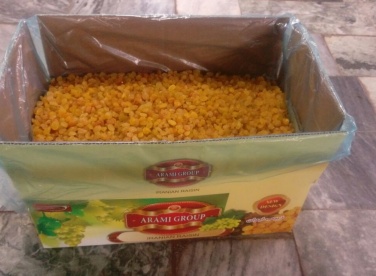
GOLDEN ANGORI RAISINS
Golden Raisin Sun-Made Golden Raisins are grown in the most parts of Iran, so they are golden amber in color with a naturally sweet and fruity flavor. Golden seedless raisins come from quality Thompson Seedless raisins that are treated with sulphur dioxide to retain their golden color. These sweet and chewy raisins are a delicious snack on their own, but can also be added to trail mixes, baked goods and granolas for an extra healthy snack.
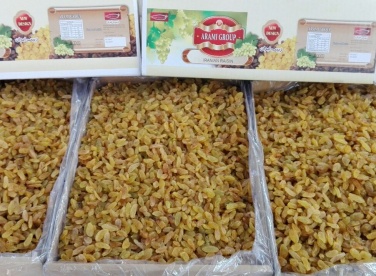
KASHMARY RAISINS
KASHMARY RAISINS Kashmary raisins, also known as long raisins and produced from local type Iranian raisins. This kind is famous for its special sweet and sour taste and its long length shape. Long raisin like golden raisins are made using sulfur fumigation process and shade dried so they are green in color. This type is popular for those who dislike the extreme sweat flavor of other raisins types. Like other types, kashmar raisins are dried, coated with vegetable oil, stemmed, mechanically cleaned, laser and hand sorted then materials detected under extreme care of hygienic conditions and with legal and safety requirements and the customers special specifications.
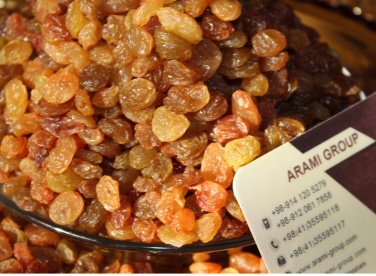
SULTANA RAISINS
SULTANA RAISINS Sultana is made of the best seedless grapes. To reach the desired quality, all raisins are washed and sorted twice in each process and then dipped in edible oil and then dried. Iranian sultana raisins are available in two color light brown and dark brown and tend to be sweeter. Sultana raisins have a delicate and unique flavor.
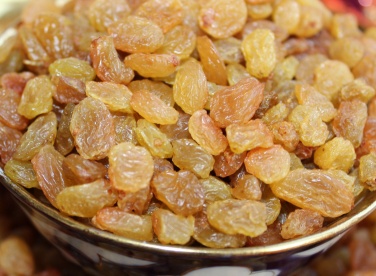
MALAYER RAISINS
MALAYER RAISINS from Iran The raisin offered by us has pure fructose that helps in offering quick energy to the consumers. These fat-free Malayer raisin are excellent source of fibers and antioxidants. These are cultivated and harvested in a natural and hygienic way without use of any chemicals. They are extensively used in variety of dishes and cuisines. Features: • Rich aroma • High nutritional content • Affordable prices • Wide application in food items
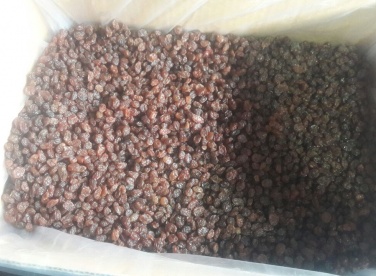
SUN-DRIED RAISINS from Iran
SUN-DRIED RAISINS from Iran Directly are dried buy sun and no additional materials are added to them and results in a dark color.The sweet test of natural raisin is perceptible
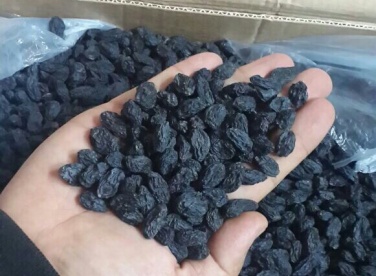
Currant from Uzbekistan
Currant from Uzbekistan Currants are dried, black, seedless grapes. Currants are an excellent source of antioxidants and polyphenol compounds (1) (flavonoids, anthocyanins, proanthocyanidins, procyanidins, resveratrol) and it has a very high antioxidant content (2). The currants have some advantages over several other fruits because they are coming from black/deep blue grapes, which are considered as better phenolic source than white grape in antioxidants and anthocyanins (3). The drying of currants under low relative humidity and in moderate temperatures allows the preservation of antioxidants and vitamins of grapes when they are turned to currants.
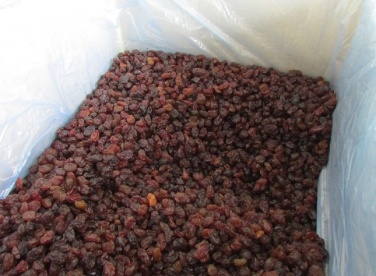
sundry from uzbekistan
sundry from uzbekistan
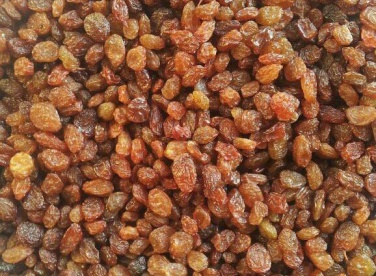
light brown sultana raisins from uzbekistan
light brown sultana raisins from uzbekistan
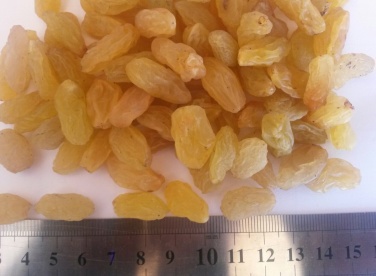
seedless golden raisins from Uzbekistan
seedless golden raisins from Uzbekistan
Industrial raisins
Industrial raisins from Afghanistan and Iran and Uzbekistan
INFORMATION
Health Benefits of RAISINS
- Raisins are dense sources of energy, vitamins, minerals, and anti-oxidants. On weight per weight comparison basis, 100 g of dried grapes provide 249 calories, several times more fiber, vitamins, minerals and poly-phenol antioxidants than the fresh grapes. Raisins, however, contain fewer amounts of vitamin C, folic acid, carotenes, lutein and xanthins than in the fresh grapes.
- The total measured anti-oxidant strength (ORAC value) of 100 g raisin is 3037 µmol Trolex Equivalents (TE), while that of fresh grapes 1118 µmol TE/100 g.
- As in grapes, raisins also contain phytochemical compound resveratrol. Resveratrol, a polyphenol anti-oxidant, has anti-inflammatory, anti-cancer, blood cholesterol lowering activities. Studies suggest that resveratrol has been found to have protective action against cancers like melanoma, colon and prostate, and diseases such as coronary heart disease (CHD), degenerative nerve disease, Alzheimer's disease and viral/ fungal infections.
- In addition, resveratrol reduces stroke risk by altering the molecular mechanisms in the blood vessels. It does so firstly by reducing susceptibility of blood vessels damage through decreased activity of angiotensin (a systemic hormone causing blood vessel constriction that would elevate blood pressure) and secondly, through increased production of the vasodilator substance, nitric oxide (a beneficial compound that causes relaxation of blood vessels).
- Like in grapes they, especially those derived from red/purple grapes, are very high in anthocyanins, another class of polyphenolic anti-oxidants. Anthocyanins have been found to have anti-allergic, anti-inflammatory, anti-microbial and anti-cancer activities.
- 100 g raisins provide 3.7 g or 10% of daily-required levels of dietary fiber. Studies suggest moderate fiber in the diet help lower body weight, cholesterol levels in the blood, and colon and breast cancer incidence as well as constipation episodes by decreasing GI transit time of food. Furthermore, they are also abundant in flavonoid compounds such as tartaric acid, tannins, catechins...etc. Together with inulin and fiber; these compounds aid in smooth bowel movements through their laxative function.
- They are free of gluten toxin and can be consumed by people who do not tolerate gluten as an alternative healthy food.
- Raisins are dense sources minerals like calcium, iron, manganese, magnesium copper, fluoride, and zinc. Copper and manganese are an essential co-factor of antioxidant enzyme, superoxide dismutase. 100 g provides 23% daily requirement levels of iron.
- In addition, they are rich in heart-healthy electrolyte potassium. 100 g provide 749 mg of potassium. Potassium reduces heart rate, blood pressure by countering sodium and thereby helps prevent stroke, CHD, and peripheral vascular diseases.
- Furthermore, they are also good source of some B-complex vitamins such as thiamin, pyridoxine, riboflavin, and pantothenic acid.





